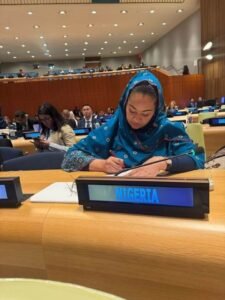
By Ibrahim Kegbegbe
Senator Natasha Akpoti-Uduaghan, representing Kogi Central in Nigeria’s National Assembly, has taken her suspension case against Senate President Godswill Akpabio to the Inter-Parliamentary Union (IPU), seeking international intervention in what she describes as a politically motivated action.
Speaking at the Women in Parliament session of the IPU meeting held at the United Nations headquarters in New York, Senator Akpoti-Uduaghan decried her suspension from the Nigerian Senate, which she claims was orchestrated to silence her. She urged the global parliamentary body to intervene in upholding democratic principles and ensuring justice.
Her suspension, announced on March 6, 2025, followed accusations that she violated Senate rules, including failing to sit in her assigned seat, speaking without recognition, and making comments deemed abusive toward Senate leadership. However, political analysts argue that the decision was influenced by her recent allegations against Senate President Akpabio.
Shortly before her suspension, the lawmaker had accused Akpabio of sexual assault—an allegation he vehemently denied. In response, she has filed a ₦100 billion lawsuit against Akpabio, challenging both the alleged misconduct and what she describes as a coordinated attempt to tarnish her political career.
“I am here to call on international organizations and democracy advocates to take note of the suppression of voices in Nigeria’s legislative system. The world cannot afford to look away when democracy is under threat,” Senator Akpoti-Uduaghan stated during her address at the UN.
The IPU, an international organization that promotes democratic governance and human rights within legislative institutions, is expected to review her claims. While it does not have direct legal power over national parliaments, the IPU’s influence in diplomatic and democratic affairs could bring increased international scrutiny to the case.
In Nigeria, the controversy surrounding her suspension has sparked debates on gender representation, political suppression, and the independence of the legislature. Many civil society groups and human rights organizations have condemned the Senate’s decision, calling for her immediate reinstatement and a transparent investigation into her claims.
As the situation unfolds, observers say this case could set a significant precedent for women in Nigerian politics and the broader struggle for accountability and democratic fairness in the country.
Public Reactions and Political Implications
Senator Akpoti-Uduaghan’s case has drawn mixed reactions from both supporters and critics. While some see her move to the IPU as a bold step toward justice, others argue that taking Nigeria’s internal legislative matters to an international stage could undermine the country’s sovereignty.
Political analysts believe that her legal action against Akpabio, along with international pressure, could impact the political landscape in Nigeria ahead of the 2027 general elections. The case also raises concerns about how dissenting voices—especially female legislators—are treated in the country’s male-dominated political arena.
With the IPU now involved, the next steps could determine whether Nigeria’s Senate upholds its disciplinary action against Akpoti-Uduaghan or reconsiders its stance under mounting global scrutiny.
What Next?
Legal experts suggest that the senator’s lawsuit could take months or even years to resolve, but the political consequences may unfold much sooner. If the IPU takes a strong position on her case, it could put additional pressure on Nigerian authorities to revisit the suspension and ensure fair legislative practices.
For now, all eyes remain on how the Nigerian Senate and the international community will respond to what is shaping up to be one of the most controversial political disputes in the country’s recent history.
















